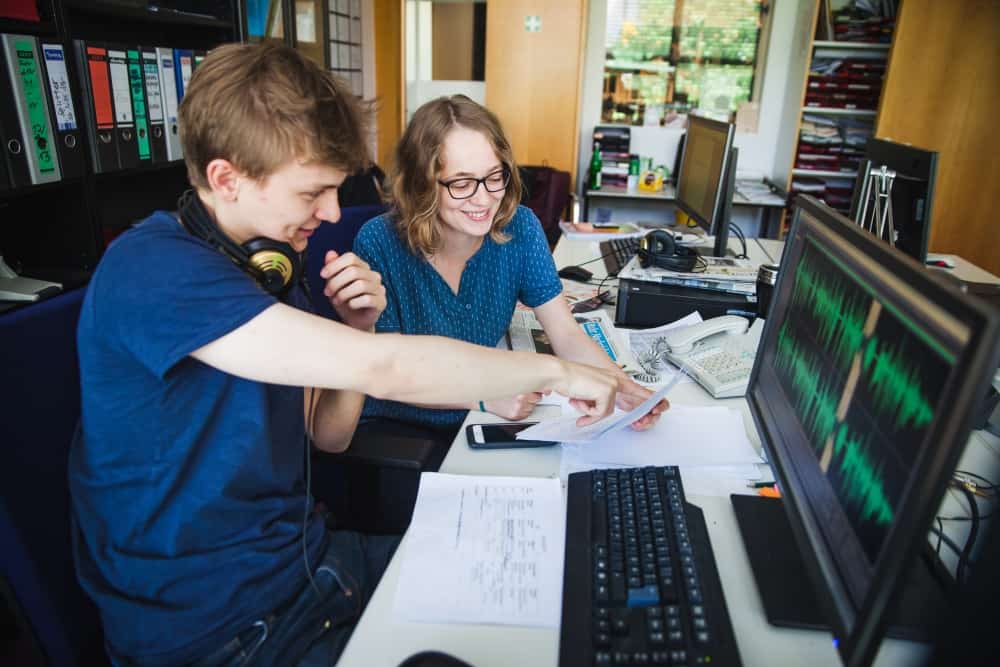
© Judith Wiesrecker
The digitalisation has significantly changed the dynamics of journalism and the job of journalists. Journalism education should stay abreast of these changes. Against this background, we have analysed how academic journalism education in Germany, Hungary, Portugal and Romania teaches new skills needed for todays’ journalists. The key focus is on data journalism, collaborative journalism, new business models and ethical challenges for journalists in the digital age.
Before we share some of our findings, it makes sense to offer a brief definition of these concepts.
Data Journalism
Many interesting stories hide in data sets. These stories would never come to light without knowledge in coding, data analysis and statistics. Furthermore, the use of data by journalists can strengthen journalistic objectivity and can help to hold governments to account more effectively. The Open Data Movement contributes to this by helping to make big data sets publicly accessible.
Collaborative Journalism
Collaborations between journalists and between media organisations gain importance, especially for those concerned with investigative journalism. Collaboration allows them to join resources and expertise to investigate issues of public relevance, for example in the fields of politics, business and crime – both at a pan-national and a cross-border level.
New Business Models
Traditional business models do not work any longer in the digital media world. To maintain quality journalism, new business models must be developed and existing ones like paid content, micropayments and crowdfunding must be refined. Media companies must rethink their strategies and journalists who are able to think in an entrepreneurial way are increasingly in demand.
New Ethical Challenges For Journalists
Journalists are faced with several issues which create new ethical challenges in the digital age, such as the spread of disinformation. Once speed becomes more important than accuracy, major mistakes can occur. At the same time, the verification of information has become more important than ever.
To determine how these four fields are taught in academic journalism education in Germany, Hungary, Portugal and Romania, we analysed the curricula of six selected journalism programmes at public and private universities and universities of applied sciences in each country. Furthermore, we conducted interviews with 25 academic journalism educators and 21 leading journalists from the four countries between February and May 2018.
Data Journalism In The Curricula
As the analysis of the curricula and the interviews shows, the universities in the four studied countries attach a different importance to the teaching of data journalism. Most analysed study programmes teach data journalism in one way or another, but not all offer data journalism as a specific course and instead integrate it into other courses. In Portugal, only one university offers a specific course for data journalism (ISCTE-University Institute of Lisbon), while in Hungary two universities do the same (Metropolitan University Budapest and Eötvös Loránd University). In Romania, four of the six analysed study programmes teach data journalism as a specific course, among them the Alexandru Ioan Cuza University in Iași. “Due to the latest developments in journalism, we needed to introduce a data journalism course”, said journalism professor Alexandru Lăzescu. He believes that it is “an asset for journalists if they also have training in data journalism, as they have more working tools”.
In Germany, all six analysed journalism programmes teach courses in data journalism, but the intensity and the amount of acquired knowledge and practise sessions varies. The bachelor’s programme in science journalism at the Technical University of Dortmund has offered data journalism as a second subject since 2014. While the journalism bachelor’s programme at the Macromedia University of Applied Sciences in Cologne and the master’s programme “Journalism and Communication Studies” at the University of Hamburg are eager to enhance their data journalism offer in the future, there are no such plans at the journalism bachelor’s programme at the Catholic University of Eichstätt-Ingolstadt and at the journalism master’s programme at the University of Mainz. The journalism professors Klaus Meier (Eichstätt) and Tanjev Schultz (Mainz) cautioned that only a limited number of data journalists will be able to make a living from this specialisation.
Collaborative Journalism In The Curricula
None of the analysed programmes in Germany, Hungary, Portugal and Romania teaches collaborative journalism as a specific course. The most widespread form to prepare students for collaboration in journalism is to make them work in teams. German journalism professor Klaus Meier regards teamwork as a good base: “There are quite a lot of courses and workshops where we force students to work in teams. And once you are able to work in teams, you will be able to work in international teams afterwards.”
The Nova University of Lisbon in Portugal has been part of a collaborative project called Repórteres em Construção (Reporters in Construction), where journalism students from several Portuguese universities produce investigative reporting for a website and a radio show on Rádio Renascença.
In Germany, Portugal and Romania some programmes also use the format of lectures to introduce forms of collaboration in journalism and to discuss case studies. Students learn how collaborative journalistic projects are organised and which difficulties can occur.
New Business Models In The Curricula
Almost all analysed study programmes in the four countries offer courses in media economics. New business models, however, are seldom in the focus. Only in Germany, almost all programmes included questions on the financial future of journalism into their curricula and offer students to learn about or discuss new business models. However, the journalism and communication studies programme at the University of Hamburg does not offer courses on this topic. Head of studies Michael Brüggemann justifies this approach by saying: “We believe that the difference between newsrooms and publishing companies is reasonable as it provides for journalistic professionalism: journalists should not have to worry about how to finance journalism. Developing business models should be in the hands of media managers.”
In Portugal, the ISCTE-University Institute of Lisbon and the University Autónoma of Lisbon offer specific courses on business models, and in Romania, there is a course at the University of Bucharest which prepares students to think about media companies’ financial challenges and new possibilities. In the analysed study programmes in Hungary, new business models is not a topic which receives much attention; only Budapest Metropolitan University teaches a personal branding course for future freelance journalists.
New Ethical Challenges In The Curricula
All analysed institutions in Germany, Hungary, Portugal and Romania offer general courses in media ethics and try to integrate the new challenges such as the handling of disinformation. While the study programmes in Germany, Portugal and Romania offer specific ethics courses for journalists, this is not always the case in Hungary. The interviewed Hungarian journalists also believe that issues of journalism ethics have been neglected in journalism education as well as in everyday working life. Gergely Dudás, former editor-in-chief of Index.hu and founder of Politis.hu, emphasised that journalists in Hungary do not accept the work of accountability mechanisms, like press councils, and consider it a waste of time to deal with complaints about unethical practices.
In Romania and Portugal ethics play a rather minor role for practising journalists. Journalism professor Gabriel Hasmațuchi from the Lucian Blaga University of Sibiu said: “Students told us that when they were hired, people in the media advised them to forget all the rubbish that they learned in journalism school, to forget ethics.” His Portuguese colleague António Granado from the Nova University believes that journalism graduates in Portugal do not apply their acquired knowledge about ethics in their job as a journalist.
Striking Differences
It is striking that the Hungarian journalism programmes under study lag behind in every one of our four fields. Academic journalism education in Hungary is to be seen as a special case as journalism education is integrated into media and communication programmes and there are no independent journalism programmes at higher education institutions.
However, in the other three countries under study, it is also quite difficult for universities to offer specific courses in the four studied areas. The interviewed respondents stressed that they are often constrained by a lack of resources which would be necessary to afford an up-to-date technical equipment and adequately trained teaching staff. This is especially true for the field of data journalism. As most academic staff are not experienced in data journalism, universities need to hire practising data journalists as guest lecturers. Many, however, do not have the funds for this. Other obstacles to innovations in the curricula are resistant supervisors or colleagues who do not see the need for any transformation.
The interviewed journalism educators and journalists in all four countries agreed that the on-going digitalisation has been posing challenges to journalism on many levels, but that “old” skills like critical thinking, good writing or verifying information will continue to be important. However, they emphasise that in addition, today’s journalists must master new technology-related skills like data journalism or editing multimedia content.
The respondents stressed that there is no need to follow every media trend in journalism education. Teachers should not try to include every new development in the industry but focus on core competencies. Many of the respondents stated that not every journalist needs to be able to code, but that it is important to have some understanding for it and to be able to collaborate for example with computer scientists.
The research report “New Skills for the Next Generation of Journalists” is available for download here.
If you liked this story you might also be interested in “They tell the truth I like” – Partisan And Alternative News Sites in Europe.
Sign up for the EJO’s regular monthly newsletter or follow us on Twitter.
Tags: business models, collaborative journalism, Data Journalism, education, education of journalists, Future of Journalism, Journalism, Journalism Education, journalism ethics, media, Media outlets, reporting












































